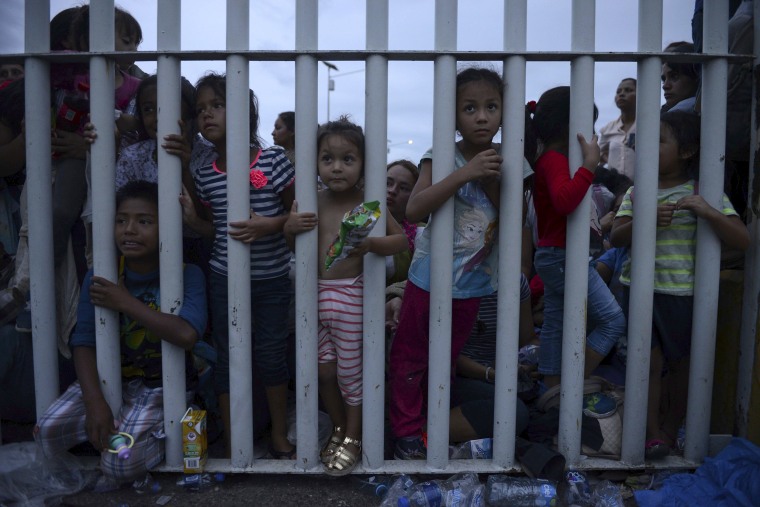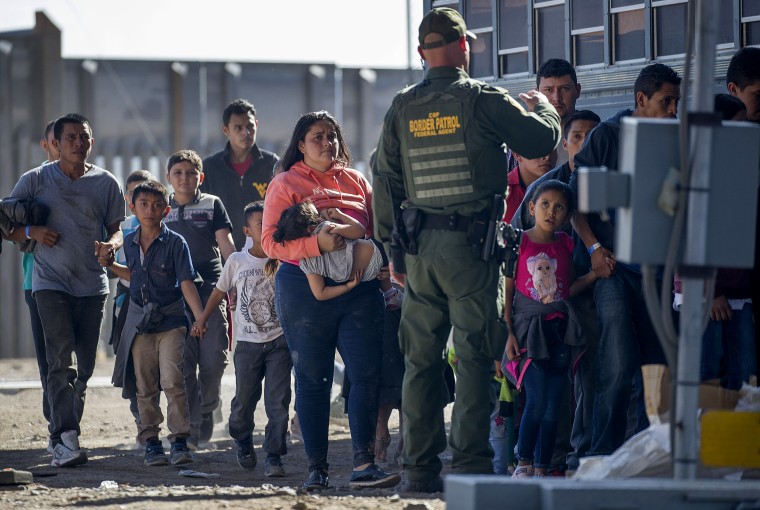WASHINGTON — Migrant children at the Southwest border increasingly find themselves caught in a bureaucratic purgatory, stuck sleeping on concrete benches or even outside at Border Patrol stations, while the agency that’s supposed to care for them is close to exceeding its capacity, according to three U.S. government officials and documents reviewed by NBC News.
Health and Human Services (HHS), the agency responsible for sheltering migrant children and matching them with a parent or sponsor, is operating at 97 percent capacity, far over its designated "red zone" of 90 percent. Because many facilities only take certain ages or genders, being so close to capacity significantly delays the ability of HHS to find children a place in its care.
Officials from the Department of Homeland Security, the agency that oversees the Border Patrol, have publicly and privately warned that there will be more deaths of children at border stations if HHS does not increase its capacity. HHS contends that its hands are tied without more funding from Congress. Meanwhile, the situation for children stuck at overcrowded Border Patrol stations is growing more dire.

As of May 31, 1,448 unaccompanied migrant children — those who cross the border without their parents — had been in Border Patrol custody more than 72 hours, the limit for a migrant of any age, according to data reviewed by NBC News. Of those, 333 were under the age of 12, including infants and toddlers. In total, 1,851 unaccompanied migrant children were in Border Patrol custody, and the vast majority — 1,402 of them were — had been processed by the Border Patrol and were waiting for HHS to designate a bed for them at one of their roughly 100 facilities across the country.
Border Patrol facilities in the Rio Grande Valley and El Paso, Texas and Yuma, Arizona are seeing the bulk of the overcrowding, according to data reviewed by NBC News.
Officials say some children there have had to sleep on concrete slabs, on floors with no mats, or even outside as they wait to be processed and sent to HHS care. Once at an HHS facility, children sleep in bunk beds, attend school and are assigned social workers who check in with them about their well-being and the status of their case.
HHS was warned in early January that its plans to close a tent facility for 3,000 children in Tornillo, Texas would mean overcrowding in facilities run by Border Patrol, the first agency to receive all undocumented migrants apprehended for crossing illegally, according to two of the U.S officials.
At the time, Tornillo had been the site of protests, including by now-Democratic presidential candidate Beto O'Rourke, for keeping "kids locked up." And children were being more rapidly placed in homes due to a change in screening procedures that allowed parents to claim their children without subjecting the entire household to a background check.
But officials from Customs and Border Protection (CBP), the subdivision of DHS that runs the Border Patrol, projected a surge in the number of unaccompanied children arriving at the southern border as the weather improved into the spring. Rather than placing 250 children per day in HHS care, CBP said the agency should be taking in closer to 350 per day in order to keep from overcrowding.
Instead, HHS has been taking in about 300 per day, according to figures reviewed by NBC News.
DHS Acting Secretary Kevin McAleenan, who was formerly the CBP commissioner, has warned that more children could die if they continue to wait in Border Patrol facilities for long periods of time.
On average, children are spending 110 hours in Border Patrol custody, with 86 of those hours, or 3.5 days, spent waiting on a pickup from HHS, according to data reviewed by NBC News.
HHS has so far been reluctant to admit it has a capacity issue.
A spokeswoman for HHS said the agency continues to receive children from DHS.
"To help estimate capacity needs, we are in daily contact with DHS regarding numbers of children being referred to HHS for care with priority given to minors pending placement," she said.
DHS and CBP did not immediately respond to a request for comment.
Sixteen-year-old Carlos Gregorio Hernandez Vasquez, who died after being diagnosed with a strain of the potent H1N1 flu virus, was the third child to die in Border Patrol custody since December. Border Patrol officials blamed his death in part on his six-day wait in a border station due to delays to move him to the custody of HHS, which is equipped to provide better living conditions and medical care.
At other times, there have been close calls. Recently a 1-year-old boy who crossed with his grandmother was kept in Border Patrol custody for nine days, according to two U.S. government officials. Because he did not cross with his legal guardian, U.S. law considered him an unaccompanied child and therefore designated to be cared for by HHS until he could be matched with a sponsor. During that time, he developed a fever of 105 degrees. Luckily, he survived and was eventually transferred to HHS custody, the officials said.
Another DHS agency, Immigration and Customs Enforcement (ICE), has also taken criticism for the backlog of children in Border Patrol custody. ICE is responsible for transporting children between Border Patrol and HHS care. But an ICE official said the agency has seen no delays as long as there are beds available for children at HHS.
"This is largely indicative of the crush of a demographic we are not prepared for," the ICE official said about the backlog of children.
A former HHS official said the agency was aware late last year that there would be capacity issues, but without Congressional funding for more space, the agency's hands are tied. A recent supplemental budget request included more beds for migrant children, but has so far been rejected in the Democratic-controlled House of Representatives, where allocating money for President Donald Trump's immigration policies is met with extreme skepticism.
The former HHS official said due to protests around the Tornillo tent facility, it will be more difficult for HHS to use "non-traditional" shelters in emergencies in the near future.


